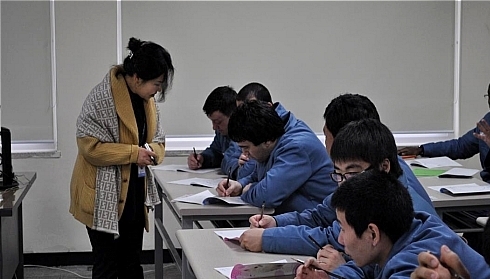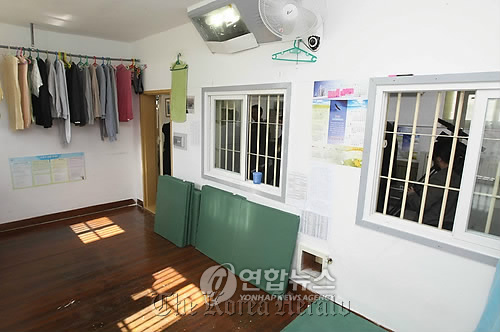 |
Inmates take a Korean language lesson at the Cheonan Foreigner Prison. |
 |
The interior of a prison cell. (Yonhap News) |
Changing attitudes
As soon as the prison was designated for foreigners, simply going from minority to majority made a big difference in a number of areas for the inmates.
“Since foreigners are the majority, the feelings of victimization just naturally disappeared, and they are very cooperative and the Koreans and foreigners have developed a helping relationship,” said Lee.
Kang also noticed a change in the inmates’ judgments of Korea, losing the feeling of animosity toward the country and its system.
With inmates from 33 countries all over the world, cultural acceptance has grown considerably within the prison population, which helped to address concerns over religious discrimination, according to Lee.
The prison also offers three different styles of meals to cater to the diverse population ― western style includes anything from bread, cheese and jam to hamburgers while the Islamic selection can include fried fish cutlets.
Able to work in factories surrounding the facility, inmates work hard to make the most of their time here.
According to prison officials, the prisoners make anything from shopping bags to toner, making an average of 200,000 won ($177) a month. Prisoners have personal accounts at the prison, and can spend their money on a wide range of stationery, food, clothing and other daily supplies.
Most inmates work hard to save their money.
According to an unnamed prison guard, there are inmates that leave with a few million won, a considerable amount depending on their home country.
Employment at the prison is based on a level system, where inmates start by making shopping bags, and move up the ladder if they work hard. Pay ranges change as well, depending on the unit cost of the product.
The programs have been a great success for the prison.
More than 80 percent of the prisoners enjoy “Good Morning Korea,” and 70 percent enjoy other special programs as well, Kang said.
“The level of satisfaction is quite high.”
Some are concerned that the prison’s expenditures outweigh the benefits.
According to a Chinese prisoner as quoted by a prison official, the facilities here are as good as “middle-class” hotels in China, raising questions about how comfortable it is for the inmates. Chinese and Taiwanese nationals make up the majority of inmates at Cheonan.
“These people have committed crimes against our people, spend our tax money to eat, sleep and have fun while in prison, and eventually leave our country with plenty of money set aside,” a Korean woman in her 20s said.
“I think it’s unfair.”
“Some can see this as a chance to do whatever they want in our country and then simply spend a jolly time in prison,” said another Korean woman also in her 20s.
By Robert Lee (rjmlee@heraldcorp.com)
<한글 요약>
외국인 교도소 개소 1년, 성공적인 결과 보여
정부에서는 외국인 범죄자의 증가에 따라 천안에 이들을 위한 외국인전담교도소를 2010년 2월 23일 열었다.
외국인전담교도소 개소 이전에는 외국인 재소자들이 한국인 직원 및 재소자들과 언어가 통하지 않아 발생하는 문제들이 많았다고 한다.
또한, 외국인들이 한국인 재소자들과 함께 생활하면서 차별도 느끼는 경우가 많았고, 이 차별은 외국인 재소자들이 한국에 대한 반감을 가지게 되는 결과를 가져오기도 했다.
같은 직업훈련을 받아도 공장주들이 한국인 재소자들을 고용하는 일이 빈번했다.
그러나 천안 외국인전담교도소에서는 외국인 재소자들이 다수가 되어 한국인 재소자들과 함께 있을 때 발생했던 문제들이 줄어들었다고 한다.
33개국에서 온 재소자들은 점차 서로의 문화를 받아들이고 있다고 한다.
또한 외국인전담교도소에서는 3가지 다른 식사를 제공하는데 빵, 치즈, 잼 등을 제공하는 양식과 돼지고기를 대체한 생선 커틀릿이 곁들여진 이슬람 음식이 있다.
실제 한 중국 재소자는 외국인전담교도소가 중국의 중급 호텔 정도 된다면서 만족을 표시하기도 했다. 천안 외국인전담교도소에는 중국과 대만에서 온 사람들이 다수를 이룬다고 한다.
한편 외국인전담교도소에 대해 불만을 표시하는 사람들도 있는데 한 20대 여성은 외국인들이 한국인들 상대로 범죄를 저지르고, 한국인들의 세금으로 운영되는 교도소에서 즐거운 생활을 하고 있고, 나중엔 노동으로 번 임금을 본국으로 가져가기 까지 한다는 것은 불공평하다고 의견을 표시하기도 했다.



![[From the Scene] Tech meets trash: Transforming plastic recycling for sustainable future](http://res.heraldm.com/phpwas/restmb_idxmake.php?idx=644&simg=/content/image/2024/12/20/20241220050035_0.jpg)


